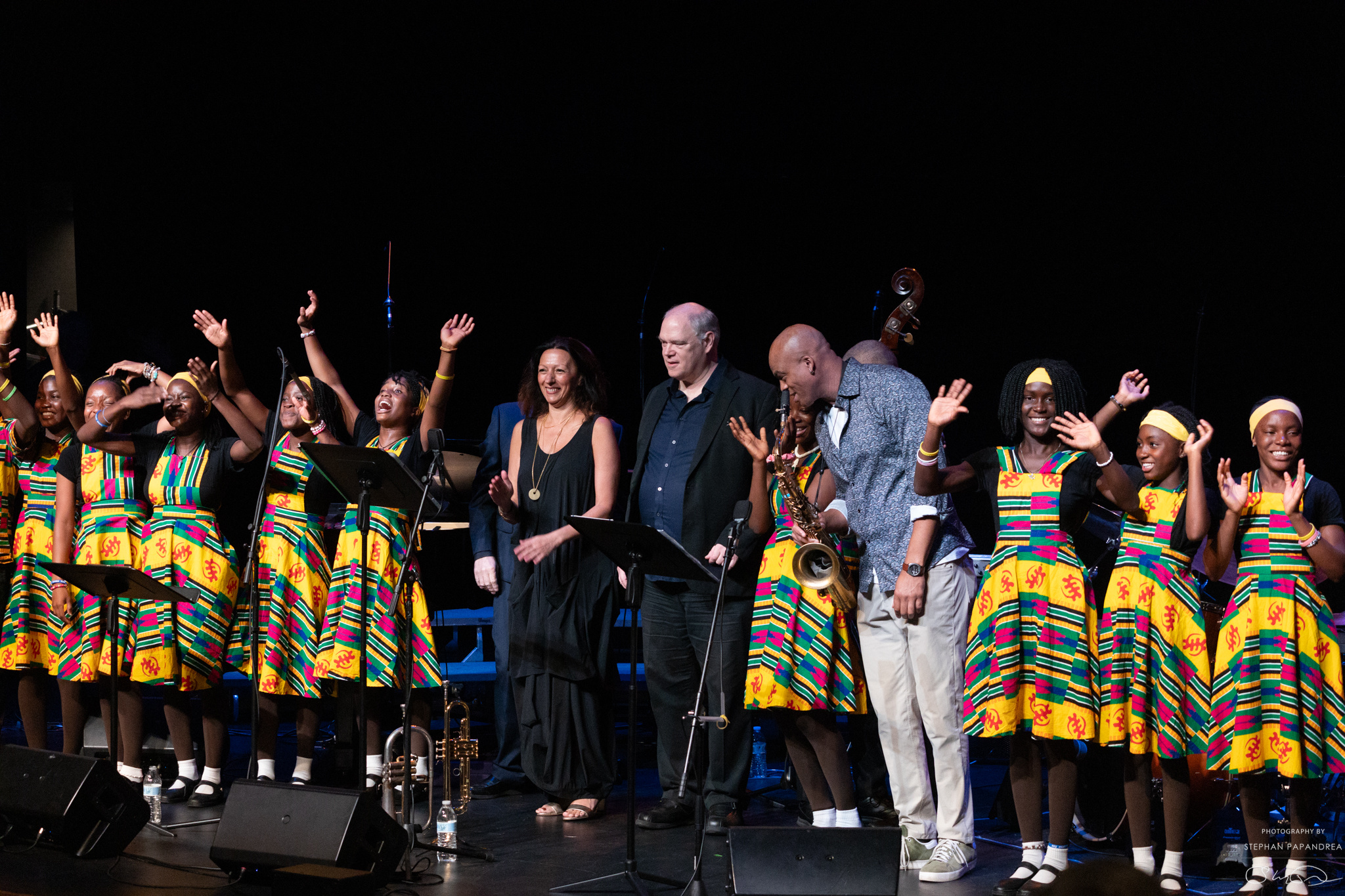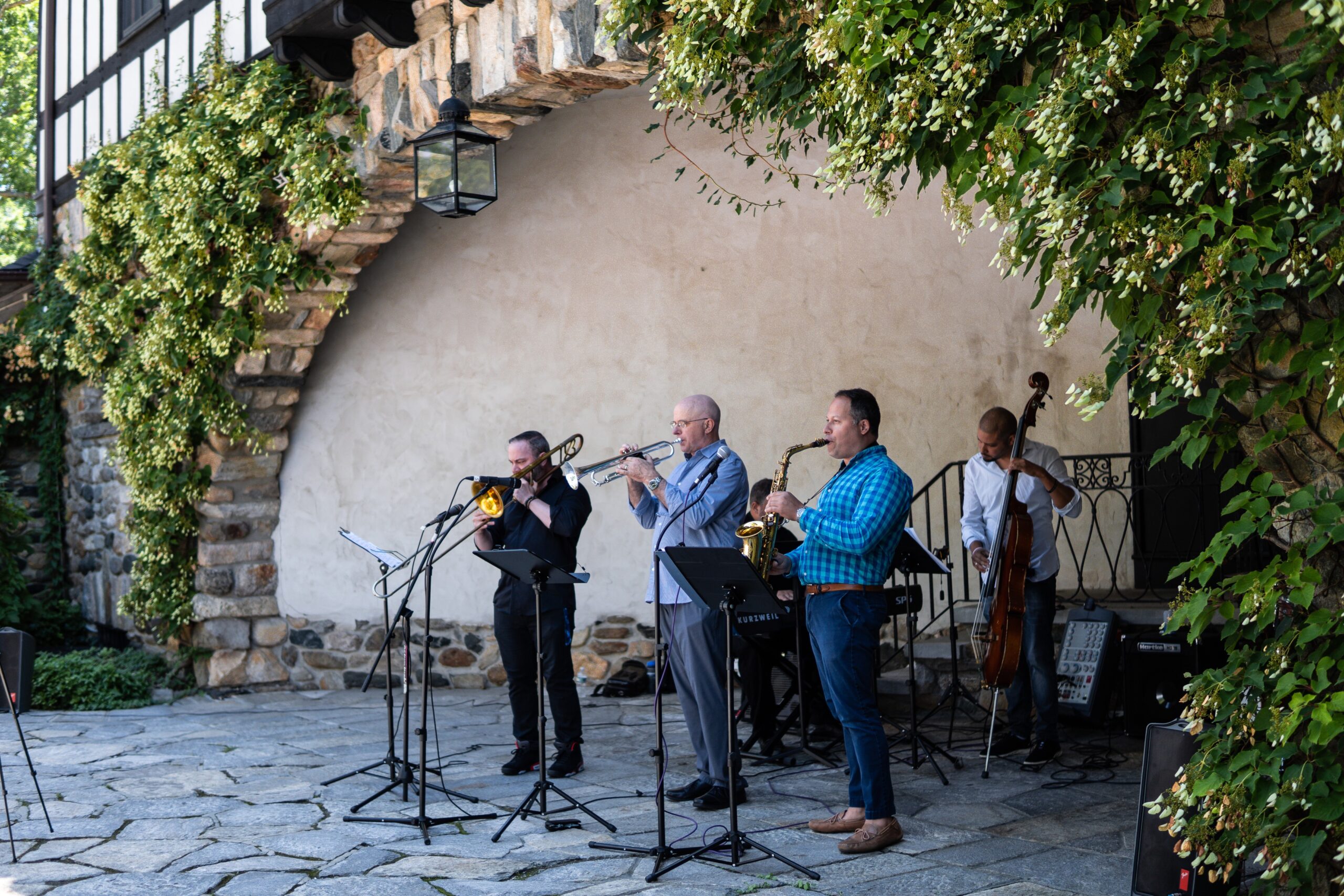Pianist/composer Amina Figarova pairs her stellar sextet with a choir of orphaned and at-risk children from Liberia on her masterful new album
Suite for Africa, out NOW via AmFi Records, features Wayne Escoffery, Bart Platteau, Alex Pope Norris, Yasushi Nakamura and Rudy Royston, joined by West Africa’s Matsiko World Orphan Choir
Azerbaijani-born, New York-based pianist and composer Amina Figarova was inspired to write her new “Suite for Africa” by her experiences meeting students during her travels to South Africa. But it was a chance encounter in the air that brought the stirring piece fully to life, as a travel mishap placed Figarova and her band on the same flight as the Matsiko World Orphan Choir, an ensemble of orphaned and at-risk children from war-ravaged Liberia.
The masterpiece that ensued forms the core of Figarova’s breathtaking new album, Suite for Africa. In addition to the 24-piece choir, Figarova is joined by her stellar longtime band: tenor saxophonist Wayne Escoffery, flutist Bart Platteau, trumpeter Alex Pope Norris, bassist Luques Curtis, and drummer Rudy Royston. The three-movement suite is bracketed by five complementary Figarova originals inspired by African rhythms and the folk music traditions of the composer’s native Azerbaijan.
The birth of Suite for Africa was prompted by Figarova’s visits to the annual Joy of Jazz festival in Johannesburg, South Africa. She discovered that the young musicians she met during master classes at the event were as talented as those elsewhere around the globe, but faced a shortage of instruments and opportunities with which to develop their gifts. As she recalls, “I left thinking, ‘What can I do? How can I help?’ I decided to write a piece for a children’s choir, and maybe they could become ambassadors for other kids.”
The initial version of “Suite for Africa” premiered at Joy of Jazz in 2018, but Figarova’s desire to reprise and record the piece was thwarted by the now-familiar events of the next few years. After life resumed, it was during a last-minute flight home from Brussels to New York City that Figarova met two gregarious young girls en route to the States. “I asked who they were and they told me, ‘We’re from Africa and we’re going to America to sing!’ They were so enthusiastic, and then I saw that their t-shirts said, ‘Matsiko World Orphan Choir.’”
Created under the auspices of the educational organization Matsiko Children International, the World Orphan Choir uses music in its mission to turn “the pain of loss, hunger, and hopelessness into personal empowerment.” The choir has performed at the White House under three different administrations, at the Rose Bowl and a number of major league sports stadiums across the US, and at Disneyland and Disney World.
Sensing the hand of fate, Figarova introduced herself to the choir’s creative director, Mark Hegarty, who also happens to be a songwriter and broadcaster. Hegarty was not only eager to involve the World Orphan Choir in Figarova’s project, but he also offered to pen lyrics for the suite tailored to the young singers’ experiences. His contributions, Figarova says, “made the project complete. It felt like the music I had written in 2018 was waiting for those lyrics. Every word, every phrase that he wrote means the world to these kids.”
“Africa is my homeland,” they sing on the first movement, “Spirit Africa, Spirit Liberia,” continuing, “Mother Africa, my soul.” The second piece, “Fifteen as One,” references the disparate Liberian tribes from which these children hail – often violently antagonistic at home, they stand united and harmonious in the choir. Built on a hummed drone, “Forgotten Children” is an urgent plea from the children to their elders to take heed of the example they set and the future they yearn for. “Forgotten children sing,” they intone. “Using our voice for change.”
The choir’s voices are profoundly moving, imbued with a jubilant spirit and a bold optimism. The ensemble joined Figarova’s sextet for a Jazzmobile-sponsored performance at Harlem’s Interchurch Center last summer, and Figarova recalls the striking effect that the brightly-attired choir had on the audience, one that she hopes to replicate with a series of festival and concert performances during 2024.
“They sing from the bottom of their heart and that translates to the audience in volumes,” the pianist says. “With the extraordinary energy that comes from them, it’s like they’re pouring love out while they sing. I’ve never seen a full concert hall so emotionally involved. Afterward, we found the crowd waiting for us, asking how they could help these children. It was the most emotional concert I’ve played in my lifetime.”
To complete the program, Figarova determined to write a set of music for the sextet that would echo African rhythms, albeit derived more from the South African traditions that she’d encountered firsthand. Somehow drawing inspiration from another place directed her homewards as well, and she wove modal elements from Azerbaijani mugham into her compositions for the first time. “It felt like building a bridge between where I’m from and the African grooves,” she says.
Those elements converge on “Dancing Clouds,” the album’s buoyant opening track, built on lilting, percussive piano, and a lyrical melody over a dancing bass line. Platteau, Escoffery, and Norris weave weightlessly around each other to initiate the uplifting solos. The title comes from the lighter-than-air atmosphere while referencing the composer’s airborne introduction to the choir.
Following “Suite for Africa,” the lush, tender “Faith Is Her Name” is dedicated to one of the choir singers, a particularly gifted young girl that Figarova has taken under her wing, connecting with her for regular vocal lessons over Zoom. “Faith has an incredible voice for such a young girl – low, warm and velvety. She also has a beautiful smile and carries herself with style.” Beginning with Norris’ horn reverberating over the sound of rain on water, expanding into a chorale-like fanfare, “Rain River” pairs with “Faith Is Her Name” to express how deeply Figarova misses her young collaborators now that they’ve returned to Liberia.
“Worldwide” not only reflects Figarova’s globe-spanning influences but also recognizes the universal language of music. When she debuted the tune in concert, audiences were immediately enraptured by Nakamura’s propulsive bass line. “It’s something that everybody can sing along with no matter where you are from,” Figarova says.
The album concludes with “Paper Kites,” with Royston’s lithe, ebullient rhythms sending the sextet aloft once again, a portrait of the sky viewed from Johannesburg’s mountainous elevations. The horn arrangements again pull from South African traditions.
Suite for Africa represents Figarova’s most dazzling and ambitious work to date, overflowing with the exuberant spirit of the young choir, the vibrant and dynamic interaction of her superb sextet, and the deft tapestry of global traditions that she so elegantly melds in these stunning compositions. It may be a suite penned for Africa, but it offers a wealth of rewards to listeners around the world. Suite for Africa Is out now wherever you stream or purchase music!





